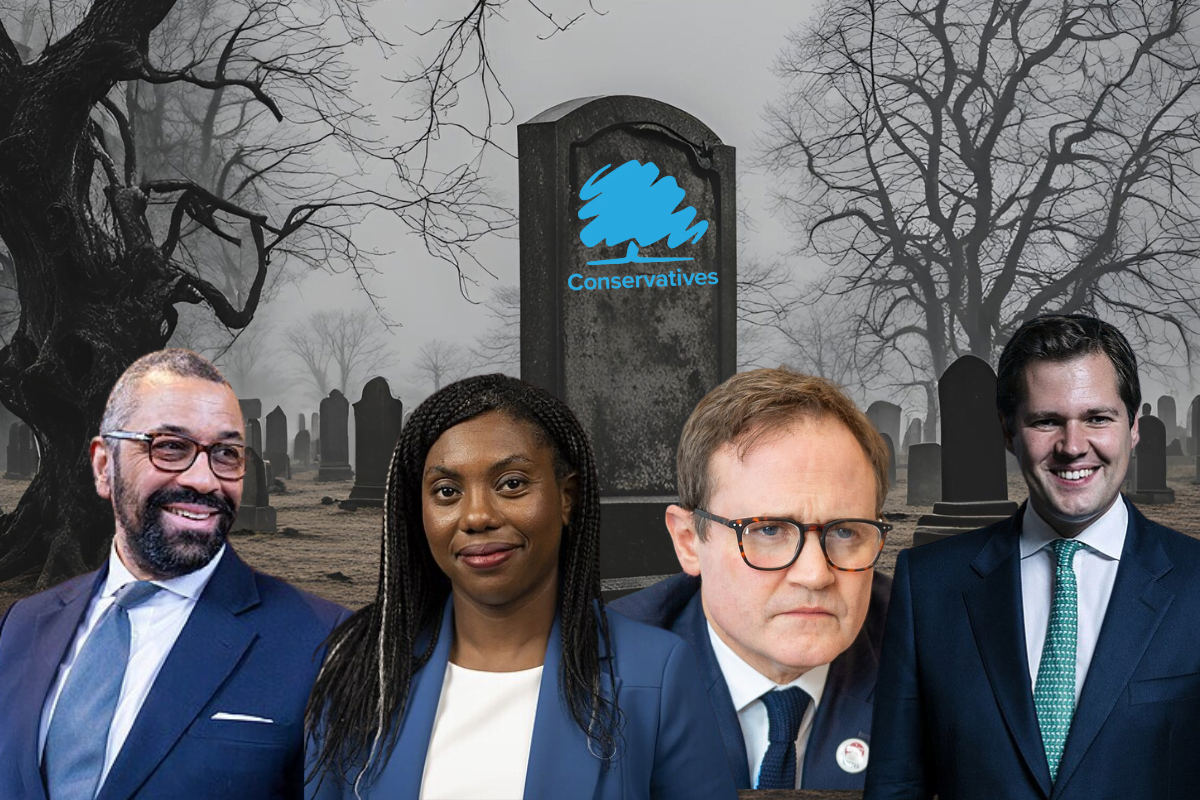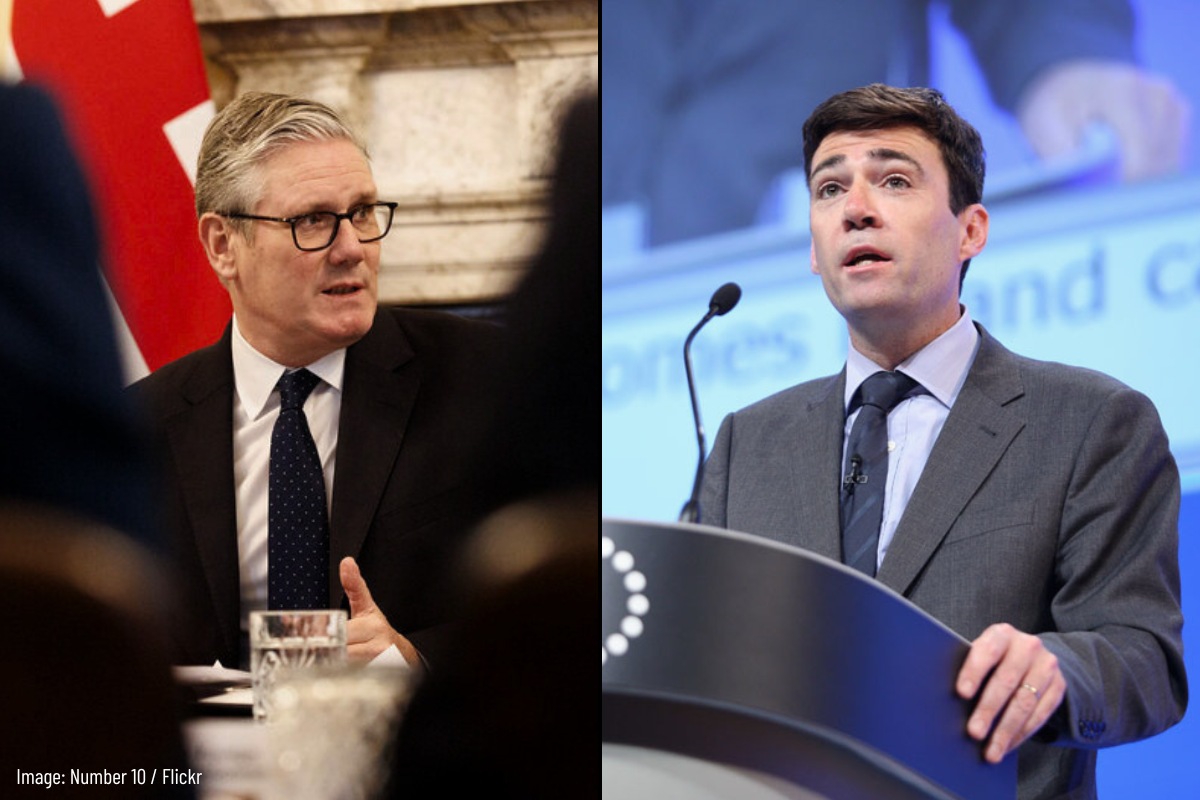If a Tory leadership candidate falls in Westminster, and nobody is listening, do they still make a sound?
This existential question haunts the Conservatives, as the party embarks upon its latest quest to select a new leader.
In fact, two Tory MPs have already dropped out of the race, having come bottom of the list in terms of votes amongst their parliamentary peers: Priti Patel, the former home secretary and one–time architect of the ‘hostile environment’ against migrants; and Mel Stride, the former work and pensions secretary, who most of the public – according to focus groups – would struggle to identify in a lineup.
The four remaining contenders are: Robert Jenrick, a notorious headbanger and scandal–ridden ex-minister for immigration, who has garnered the most support amongst Conservative MPs thus far; James Cleverly, another former home secretary, and a relative ‘moderate’ in the party; Tom Tugendhat, an ex-military man, who is mostly appealing to the more liberal wing of the Tories; and Kemi Badenoch, an anti-woke tub-thumper and culture warrior, who is the bookies’ favourite to win.
These lucky contestants are set to parade themselves at the Tories’ upcoming annual conference, starting on 29 September in Birmingham, in what many have described as a ‘beauty pageant’. Expect all manner of red-meat rhetoric and incendiary bombast, designed to woo the party faithful.
Following this, the shortlist will be further whittled down to two.
The final decision will then lie in the hands of the frothing membership of the Conservative Party – no doubt with many more opportunities to impress the rabid Tory ranks along the way, with pledges to abolish all human rights legislation; build a mile high wall at the Dover (or preferably Calais) coast to ‘stop the boats’; and ban trade unions and pro–Palestine protests for good measure.
On 2 November, the winner of this arduous process will be confirmed, and Britain will have a new official Leader of the Opposition. The question is: will anyone notice or care?
Irrelevant
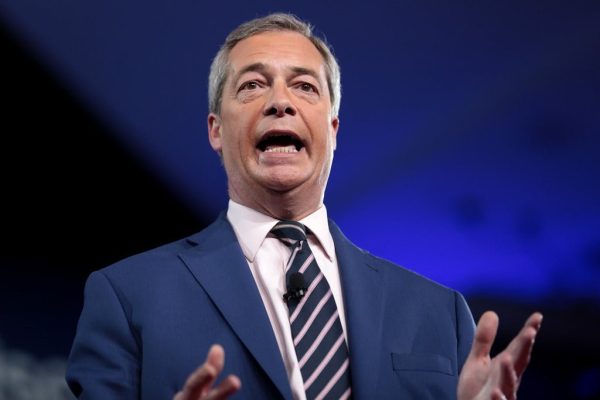
The fact is that the Tory Party, following 14 years of chaotic and disastrous rule, has managed to dig itself into a deep grave. For voters and the elites alike, it has largely become an irrelevance.
In the House of Commons, the party has been reduced to a relative rump of 121 MPs. This gallery of rogues and reprobates continue to bark and bleat. But like a petulant child at a dinner party, nobody pays them any attention. Both the media and the public happily ignore their cries.
The Conservatives might technically be His Majesty’s Most Loyal Opposition to Starmer’s government. But in reality, the Labour leaders are more concerned about squashing any rebellion from their own benches (hence the suspension of seven MPs for voting to scrap the Dickensian two-child benefit cap), and about ensuring that trade union leaders remain on board and pliant (hence their promises around public sector pay and workers’ rights).
The capitalist press, meanwhile, are more keen on giving a platform to Nigel Farage and his Reform UK outfit.
As support for Starmer and Labour falls, on the back of a new wave of austerity and attacks, this reactionary demagogue will be positioning himself to harvest the growing anti-establishment mood in society. In fact, Farage has explicitly stated that this is his aim: to be the “real opposition” to this big business government.
And it is this worry about being outflanked on their right that prompts all the deranged and deluded statements emanating from Conservative candidates on matters such as migration.
Far from neutering this political threat, such hardline language only empowers and bolsters Farage. Yet it placates frenzied Tory members. And it is they who ultimately get to decide who leads the party.
Shunned
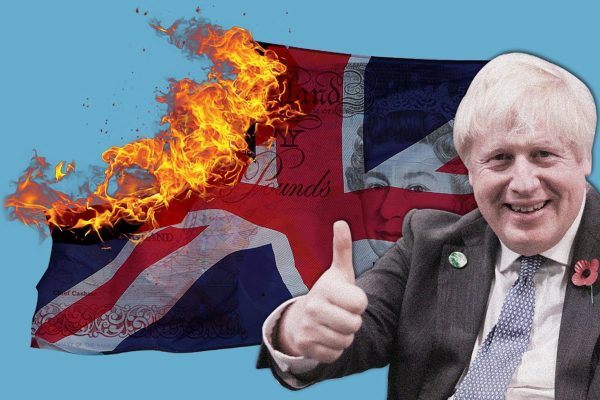
All of this underlines the ongoing degeneration of the Tory Party – in turn a reflection of the long–term decline and demise of British capitalism.
The Tories were once the most successful bourgeois party in Europe, perhaps in the world. But they, along with the rest of the British establishment, have increasingly become a laughing stock; a veritable Mad Hatters’ Tea Party, taken over (in the words of Conservative peer and former PM David Cameron) by ‘swivel-eyed loons’.
Now, even big business is shunning the Tories, in favour of Starmer’s Labour, who have actively courted the capitalists and their support.
This much will be evident at this year’s party conference season. While business leaders are set to flock to Brighton for Labour’s seaside gathering, the Tory event in Birmingham is “going to feel like a wake”, according to one senior lobbyist, speaking to the Financial Times.
“On what planet are you spending £10k to sit next to someone who won’t be a minister for five years and possibly not 10 years,” bluntly stated the same corporate influencer.
“What business gives a damn about engaging with the Conservative Party right now?” rhetorically asks a senior Tory official in the same FT article. “Business day at conference will be a total flop.”
And yet this is the logical conclusion of the Tories’ trajectory, which has taken them from being the capitalists’ primary political representatives, to a party not-so-long-ago led by Boris Johnson, who famously replied to big business’ concerns about Brexit with the curt comment: “Fuck business.”
B-team
The outcome of the current Conservative leadership contest is impossible to predict. Manoeuvres within the parliamentary party could curb the options available to members. And no doubt Tory grandees – those in tune with the thinking and interests of the more far-sighted layers of the ruling class – will be keen to avoid the election of another reckless Liz–Truss–esque figure, with all the pandemonium that would bring.

The truth is that, following the Brexit vote, in the years of Johnson and Truss, the ruling class lost control of the Tory Party. They attempted to regain a grip by parachuting in ‘sensible’ leaders like Rishi Sunak and Jeremy Hunt. But changing the captain does little to help when the ship is already sinking.
With Starmer now in Number 10, the establishment believe that they finally have a ‘safe pair of hands’ at the helm. But recent events – from the discovery of a £22 billion “black hole” in the public finances, to this summer’s far–right riots and counter–protests – indicate that the government will continue to be plagued by crises, no matter the change from Tories to Labour.
Already, the bourgeois press is admitting that ‘Starmer’s honeymoon is over’. In truth, it never began. There has never been any genuine enthusiasm for Starmer’s Labour, as shown by the fall in the party’s vote between the 2019 and 2024 general elections.
And now, recent polls indicate that support for Labour has fallen even further, with over half of Britons disapproving of the new government.
The ruling class always needs a B-team; a substitute to swap in, once those in Downing Street have done the dirty work required by their capitalist masters. But what is the alternative for the establishment once their latest champion, Starmer, is discredited?
This is why they need the Conservatives to clean up their act and select a ‘responsible adult’ as leader – or have one imposed upon them. And it is why they are so afraid of the Tories lurching even further to the right, in a bid to prevent a further haemorrhage of support to Farage’s Reform.
On 4 July, the Tories lost votes in every direction, retaining only 52 percent of the electorate that supported Johnson in 2019. 23 percent of these voters were hoovered up by Reform UK. And now the Conservatives’ prospective leaders are keen to show that they can win them back.
But this is easier said than done. 26 percent of Reform voters say they will never vote Tory again. Only 36 percent say they would consider voting Conservative. And this is before Farage’s profile and influence increases, on the back of intensifying anger against all the traditional parties and politicians.
Polarisation
Instability on every plane – economically, politically, and socially. A crisis-ridden Labour government. A Tory Party staggering to the right. This is the outlook facing the ruling class in Britain.
In this context, the ruling class might even push for the option of a national government at some point: splitting the two main parties, and forging together a coalition of Labour rightwingers and Tory ‘moderates’ (and Lib Dems – don’t forget the Lib Dems!) to serve in the ‘national interest’ (read: the interest of the bosses and bankers).
But even this would only be a short-term ‘solution’ – further tarnishing the establishment parties, playing into the hands of Farage, and paving the way for an even-greater polarisation to the right and the left.
The result would be a strengthening of the most reactionary elements in British politics, with migrant-bashing maniacs like Suella Braverman fusing with Farage and co. to provide a demagogic ‘alternative’ on the right.
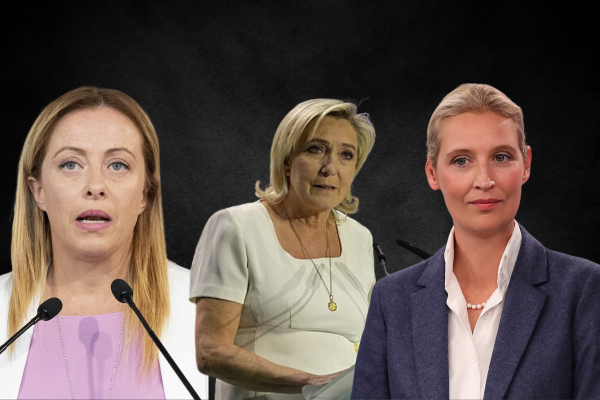
On the other side, larger and larger numbers of workers and youth would be radicalised by these events, and pushed into action – as has already been seen in embryo this summer in Britain with the counter-demos against the far right.
Similar conditions produce similar results. And the same fundamental process is taking place across the world, as the capitalist system continues to decay and putrefy.
Everywhere we look, the old ‘centre ground’ is collapsing. The political landscape is fracturing and fragmenting. And society is polarising, with volatile swings in one direction and then another – or even simultaneously.
In countries like France, Germany, and Italy, the support for traditional conservative parties has declined, with ‘populists’ like Le Pen, the AfD, and Meloni syphoning away votes to their right.
In places like the USA, with Trump and the Republicans, the jesters have taken over the court, conducting hostile takeovers of the bourgeoisie’s main political representatives.
And a similar fate may await Britain too, if a figure like Badenoch or Jenrick – or even Farage, eventually – makes their way to the head of the Tory Party.
Revolution
We cannot speculate what exactly the future looks like for the Conservatives, and for UK politics more widely. We do not have a crystal ball. But the point is that, as far as British capitalism is concerned, all roads lead to ruin.
Across the world, the forces of reaction and of radicalisation are growing in tandem, as the old order frays and is torn apart under the deepening crisis of capitalism.
From the mass movement in Bangladesh, to the re–emerging menace of fascism on Britain’s streets: we are seeing revolution and counter-revolution play out alongside each other – part of the same process of capitalist impasse and breakdown of the status quo.
This is the turbulent perspective that lies ahead of us, in Britain and internationally.
We must prepare for these stormy events, and build the revolutionary alternative – the Revolutionary Communist Party – with a sense of urgency, in order to topple this whole rotten system. That would certainly make a sound.

